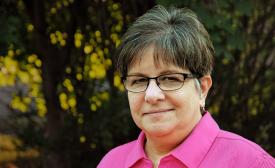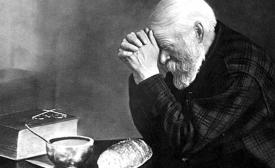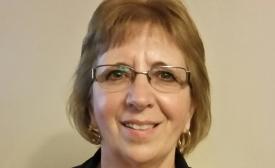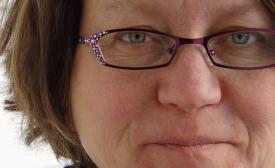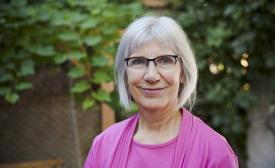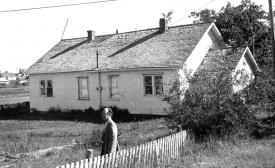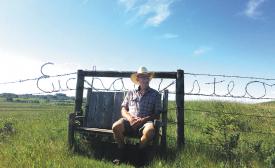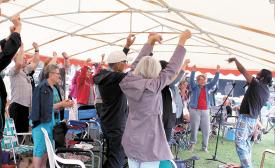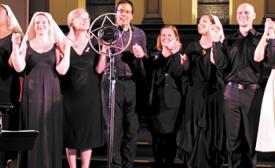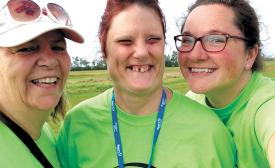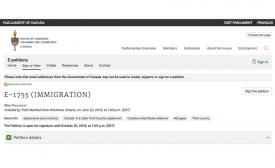Volume 22, Number 16
Nurturing spirituality
The church’s primary job is growing relationships with God, says Dave Rogalsky in the feature, “Experiencing the good news,” on page 4.
Experiencing the good news
“You . . . were marked with the seal of the promised Holy Spirit; this is the pledge of our inheritance toward redemption as God’s own people” (Ephesians 1:13-14, NRSV).
Readers write: August 27, 2018 issue
It’s important for a pastor to be married, not just living with a partner
Re: “Introducing Dave Rogalsky, Eastern Canada correspondent,” June 18, page 2.
Experiencing God
When my youngest son “graduated” from Grade 5 in June 2000, his class took a special year-end trip to Toronto. I was working as a school bus driver at the time—we lived in Ontario then—and I drove the bus. The highlight of the trip was attending The Lion King live at the Princess of Wales Theatre.
What did I get myself into?
Swirling around with ideas of strategy, focus, and “We used to do it this way,” change is messy. Grappling with the in-between is messy. Living in the liminal space between what was and what will be is messy, yet here we are, wondering, “What did I get myself into?”
Can we talk?
Are you finding yourself divided from loved ones in your family, church or neighbourhood on any number of challenging issues? Are you finding fewer opportunities to talk with others across differences? Are the chasms leading to heightened stress and fractured relationships? Do you wonder if this is the best we can do in our families and churches?
Lessons from a Thai refugee camp
Back in 1988, my wife and I chaperoned 17 high school students on a trip to visit refugee camps in Thailand. We thought the students would learn about missions and life outside of Canada. We had no idea the experience would change us forever.
Sexsmith dormitory
This is a photo of the dormitory duplex at Sexsmith Bible Institute in Alberta. The building used to function as the meeting house of the Krimmer Mennonite Brethren at Bear Lake and the General Conference Mennonites at Wembley Ranch. What was the official name of the Bible institute that used this building and the church that used it?
A perfect spot for gratitude...on the farm
Growing up, I never wanted to be a farmer. It seemed like farm machinery always had precedence over a new couch, curtains or nice shoes. Then I met my husband Bob at Rosthern Mennonite Collegiate in Saskatchewan, and he wanted to be a veterinarian. Naively, I never thought this would involve farming, so I taught elementary school while he studied.
Solitude and community
A peculiar thing happened to me last Sunday while I was on holidays. I felt a strong desire to attend a church service. Curious, to say the least. You see, by the time summer arrives, I’m usually churched out. As a pastor, church is not only my work life but a significant part of my personal and social life, too.
Helping the stranger and connecting with the neighbour
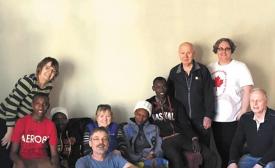
Some church members and the refugee family in their new home in March 2018. Pictured from left to right: Lois Braun, Heritier Munezero, Claudine Uwimpuhwe, Siggi Holzhaeuer, Katherine Morgan, Speciose Nyiramugwaneza, Emmanuel Iranshubije, Gordon Bueckert, Eileen Scharfenberg and Dave Martens. (Photo by Cornie Thiessen)
When Sterling Mennonite Fellowship received an invitation from St. Vital Evangelical Mennonite Church (EMC) to partner in sponsoring a refugee family, it felt like an answer to prayer.
Keeping culture and faith
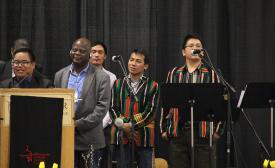
Leaders of the Matu-Chin Christian Church in Kitchener, Ont., are accepted into emerging church status in Mennonite Church Eastern Canada on April 28th at the annual regional church gathering. Pictured from left to right: Pastor Thing Sai; Pastor Westerne Joseph of the Assemblée de la Grâce in Montréal; Rothang, auditor; Yaling, treasurer; and Maung Aung, chair. (Photo by Dave Rogalsky)
Mennonite Church Eastern Canada already had several Chin congregations in its midst, with all of them having roots in the Hakha-Chin community. Like many languages, though, the Chin language from Myanmar has several dialects, and, as of this spring, the regional church is now home to the Matu-Chin Christian Church in Kitchener, whose members speak Matu-Chin.
Learning to rejoin the world
On the weekend of May 11, Jennifer Symonds, a participant at the Westview Centre4Women, shared her story as part of a conference hosted by the Niagara churches of Mennonite Church Eastern Canada. Held at Westview Christian Fellowship in St.
Putting words into actions
The Spruce River Folk Festival is held annually at Ray Funk’s farm north of Prince Albert. Mennonite Church Saskatchewan and Mennonite Central Committee (MCC) Saskatchewan help sponsor the event, which raises awareness of, and support for, landless Indigenous bands, in particular the Young Chippewayan First Nation.
A cry for ‘no revenge’
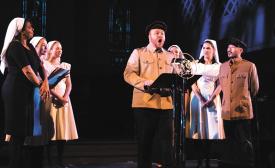
Owen McCausland (tenor), left, tells the story of the Dog from Algiers who saves his master’s life on the battlefield to Larissa Koniuk (soprano), Alexandra Beley (mezzo-soprano), and Keith Lam (baritone), in the new Llandovery Castle Opera, whose music was composed by Stephanie Martin. (Photo courtesy of Will Ford, Llandovery Castle Opera)
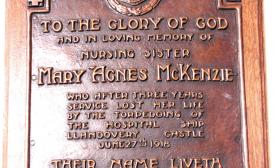
The plaque commemorating Mary Agnes McKenzie at Calvin Presbyterian Church in Toronto sent Stephanie Martin on her three-year journey to produce the opera Llandovery Castle. Years later, the church installed a stained-glass window above the plaque of Mary and Martha each serving Jesus in their own ways. (Photo by Dave Rogalsky)
Stephanie Martin had often led practises with the Pax Christi Chorale at Calvin Presbyterian Church in Toronto. But during one practice in 2015 she was drawn to a plaque on the north wall of the sanctuary honouring nurse Mary Agnes ‘Nan’ MacKenzie, “who after three years of service lost her life by the torpedoing of the hospital ship Llandovery Castle, June 27, 1918.”
Learning to be human
When I was first hired as a disability support worker at enVision Community Living in Steinbach, Man., I had no idea what I was doing. I didn’t know many people with intellectual disabilities and I certainly didn’t know what it meant to support someone with intellectual disabilities.
Rethinking the Safe Third Country Agreement
Did you know that Canada is a signatory to the Safe Third Country Agreement with the United States? It is an agreement based on the idea that both countries are equally safe places to seek asylum, something clearly disproven by recent world events.

